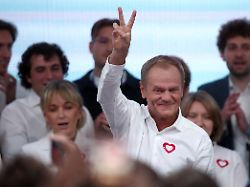Opposition to Tusk in Poland at the forefront
“The rule of the PiS is over”
October 16, 2023, 12:34 a.m
After eight years, the PiS party’s time in the Polish government is probably over for the time being: the right-wing conservatives will be the strongest force in the parliamentary elections, but are far from an absolute majority. Opposition leader Tusk celebrates the end of a “dark time”, but PiS leader Kaczynski does not want to admit defeat yet.
After the election in Poland, an alliance of three pro-European opposition parties gained a majority in parliament and wanted to replace the national conservative Law and Justice party (PiS) after eight years in government. Opposition leader Donald Tusk said the election result marked the end of a “dark time.” “The rule of the PiS is over,” said the 66-year-old head of the Citizens’ Coalition (KO) at the election party at the party headquarters in Warsaw. “Poland won, democracy won, we drove them from power.”
According to forecasts by the polling institute Ipsos, Tusk’s party can expect 31.6 percent of the vote, making it the second strongest political force. This would give her 163 seats in parliament. The citizens’ coalition could therefore form a coalition with the Christian-conservative Third Way (13 percent) and the left-wing alliance Lewica (8.6 percent). The three-party alliance would have 248 of the total 460 seats and would therefore have a majority in parliament. “On Sunday, October 15th, the bickering and almsgiving in Poland ended and cooperation and investment in our future began,” said Szymon Holownia of the Third Way about the outcome.
Kaczynski also wants to implement the agenda in opposition
According to forecasts, the PiS, which has been in power since 2015, became the strongest force with 36.8 percent of the vote, but clearly missed an absolute majority. Prime Minister Mateusz Morawiecki nevertheless spoke of a “historic victory”. Since the end of communism, no party in Poland has managed to win parliamentary elections three times in a row.
Nevertheless, the PiS has a problem: forecasts predicted that it would have 200 seats in the new parliament. Only the ultra-right Konfederacja would be considered as a coalition partner. But according to forecasts, this formation only got 6.2 percent – that would be 12 seats and therefore not enough for a government majority. In addition, the Konfederacja had repeatedly emphasized during the election campaign that it did not want to enter into an alliance with the PiS.
PiS leader Jaroslaw Kaczynski said he still had “hope” that his party could form the next government. But the 74-year-old added: “We will do everything we can to ensure that our program continues to be implemented despite the coalition that is against us.”
High voter turnout
A good 29 million eligible voters were able to vote in the election. According to the forecast, voter turnout was 73 percent. This would be the highest figure in an election since the end of communism in Poland. Extrapolations are not common in Poland. The official final result is expected on Tuesday.
The vote was also seen as a choice of direction on the future course towards the EU, Ukraine and neighboring Germany. Tusk, who led the Polish government from 2007 to 2014 and then served as EU Council President until 2019, has announced that he will improve relations with Brussels. He has also promised to liberalize abortion rights, which were tightened by the PiS.
The PiS government with its Prime Minister Mateusz Morawiecki has been waging a power struggle with Brussels for years, primarily over its judicial reform, which critics condemn as an attack on the rule of law and democracy.
The PiS election campaign was also strongly influenced by anti-German tones. The ruling party accused Tusk of acting in the interests of Germany, the EU and Russia. Ukraine and its Western supporters also closely followed the election in Poland. Poland has long been one of Kiev’s most important supporters in the EU and NATO and has taken in a million war refugees. During the election campaign, however, the Confederation Party demanded that aid to Ukraine be reduced. An import ban on Ukrainian grain, which is intended to protect Polish farmers, has recently caused tensions.
